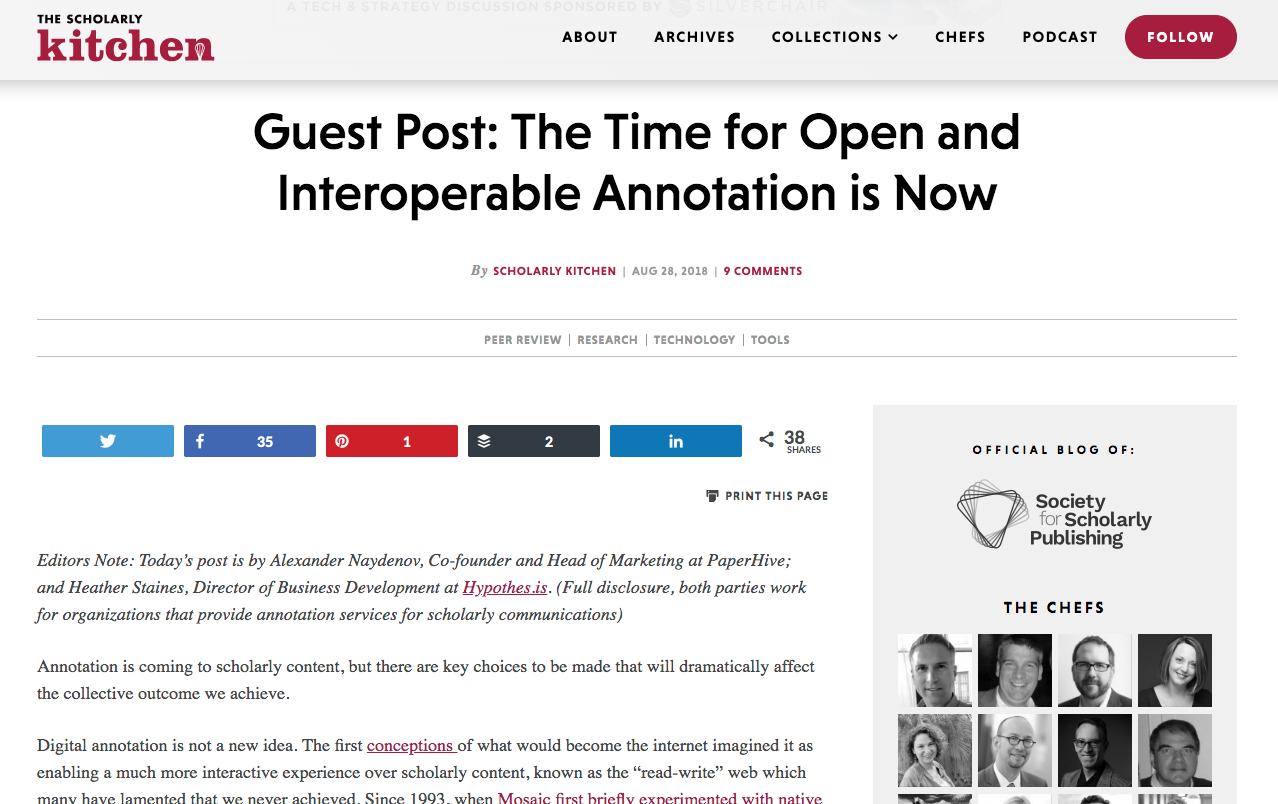Press
Hypothesis in the news.
Read what others are saying about our powerful social annotation solutions. For press inquiries, please contact us.
University of Windsor Office of Open Learning
11 December, 2018
Ever wanted to have a really great, stimulating intellectual conversation with students or colleagues? Do you think it’s just crazy talk to dream that you could actually have a meaningful conversation online, with people who have never met face to face before? Read on.
Europe PMC Blog
4 December, 2018
Scientific communication does not stop at the moment of publication. Scientific discussions in the form of post-publication peer review can provide valuable insights for published articles, bring up an alternative research perspective, or even present updates for published research. At Europe PMC it’s part of our mission to support innovation in scientific publishing, and we believe that community feedback constitutes an important part of scholarly communication process. That’s why we are proud to partner with Hypothes.is, a non-profit organisation developing open annotation tools, to display post-publication comments from PubMed Commons on articles in Europe PMC.
Ubiquity Press ]u[
15 October, 2018
We are happy to announce that we have released a technical change that allows readers to annotate e-books within the browser. Books at Ubiquity Press, and on the wider Ubiquity Partner Network, are often available in EPUB format. We use a great open source package created and maintained by Fred Chasen from FuturePress.org which allows site visitors to read the books in any browser. This means that there are no files to download and no additional software/hardware required to read the EPUB content. We are pleased to say that we have released the latest version of EPUB.js on our platform, which now supports the highly-regarded annotation overlay Hypothesis. The software is built as an open source, community-driven, non-profit service. Hypothesis is a free service to users and allows annotations, highlights, and page notes to be made publicly, privately to oneself, or to a private group (ideal for a class discussion).
FROG Learning Blog
2 October, 2018
A description of a sophisticated learning exercise at the University of Minnesota enabled by custom software applications that enable students to work together to bring multiple artifacts, including Hypothesis annotations, together into a collaboratively authored document.
The Scholarly Kitchen
28 August, 2018
Annotation is coming to scholarly content, but there are key choices to be made that will dramatically affect the collective outcome we achieve. Digital annotation is not a new idea. The first conceptions of what would become the internet imagined it as enabling a much more interactive experience over scholarly content, known as the “read-write” web which many have lamented that we never achieved. Since 1993, when Mosaic first briefly experimented with native annotation, dozens of projects have tried without success. There are many reasons for this failure: a lack of standards, an unwillingness to adopt proprietary systems and centralized implementations, poor user experience, and slow browsers among others.
EDUCAUSE Review
27 August, 2018
Working in open-access institutions with a large majority of underserved populations, community college instructors often face the twofold tasks of helping students become conversant in discipline-specific coursework and also bringing students up-to-speed in their academic skill sets. Between publishers' higher costs of textbooks and students' struggle with large amounts of reading materials, getting students to both access and engage more deeply with texts is a challenge. Using annotation tools that leverage 21st-century technology to bring social reading back to its traditional roots, instructors can help their students develop critical thinking, digital literacy, and collaboration skills.
OPERAS
30 July, 2018
This white paper has been elaborated by the Tools (R&D) Working Group, one of the 7 Working Groups launched by the OPERAS research infrastructure. The Working Group goal was to set up a list of tools and development which need to be done, to improve their usability for the OPERAS partners. The approach in OPERAS emphasizes the importance of building the open science scholarly communication infrastructure in Social Sciences and Humanities on community driven tools. In this perspective, the development of Open Source tools and the setup of a toolbox appear to be appropriate answers to the existing needs and evolutions in scholarly publishing.
Outils Froids
23 May, 2018
Il est évident que si l’on souhaite mettre en oeuvre une activité de veille collaborative, et plus spécifiquement d’analyse de l’information captée par celle-ci, il faut disposer d’outils susceptibles d’y aider. Diigo ou Hypothes.is permettent de sélectionner et éventuellement de partager les éléments importants de nos lectures et peuvent de ce fait devenir de véritables outils d’aide à l’analyse.
Hybrid Pedagogy
24 April, 2018
One example of multifaceted and multi-stakeholder partnership can be seen in a project I’ve helped to coordinate over the past few years called the Marginal Syllabus. The Marginal Syllabus convenes and sustains conversations with educators about equity in education via open and collaborative web annotation. Our initial commitment to author partnerships has grown to include active partnering with both publishers of academic content (so as to encourage openly accessible scholarly conversation), as well as with organizations like Hypothesis and the National Writing Project (who provide technical and facilitation supports). Collectively, these partnerships support K-12 educators and university faculty as they use open source technology and openly access texts that spark collaborative conversations about educational equity.
eLife
23 March, 2018
Earlier this year, we launched the annotation and commenting tool, Hypothesis, on eLife to allow users to make notes on all content, including research articles, commentaries, magazine articles and blog posts. A couple of months on, and we are already seeing different ways in which the tool is being used for holding scientific conversations online.









